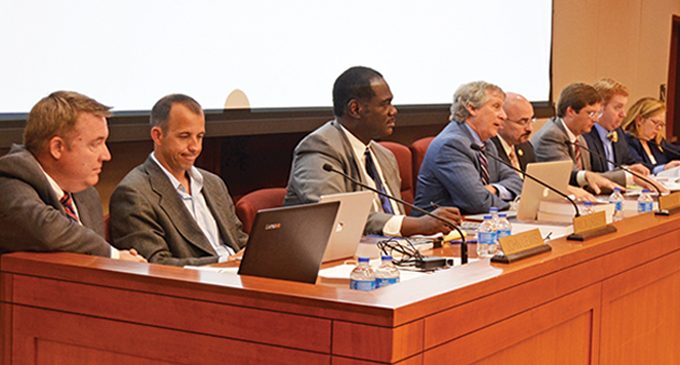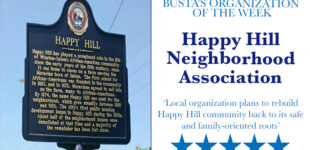N.C. Elections Board supports Sunday voting

The N.C. Bipartisan State Board of Elections & Ethics Enforcement held a meeting on Sunday at Wake Forest University to hear early voting plans that local election boards couldn’t agree on.
The State Board of Elections met at Wake Forest because it held its annual training conference for county BOE members and directors at the Benton Convention Center on Monday and Tuesday.
The Forsyth County Board of Elections (BOE) passed its plan unanimously last month when Democrats compromised with Republicans and agreed to not include Winston-Salem State University as a site. The vast majority of local BOEs in North Carolina also approved unanimous plans.
However, 15 counties did not and those were heard during the six-hour meeting. The state board could choose any plan submitted by the county BOEs and could also alter those plans if it deemed it necessary.
This is the first time the State BOE has heard disputed early voting plans since this year’s change in the makeup of election boards. The Republican-majority General Assembly passed a law shortly after Democrat Roy Cooper won the 2016 gubernatorial election that altered BOEs from having a majority from the governor’s party to being evenly split. Republicans have insisted this is for bi-partisanship while Democrats and numerous court rulings have found the law dilutes the power of a Democratic governor.
While the four-member county BOEs are now evenly split, lawmakers added one unaffiliated member to the bipartisan State BOE in response to Cooper’s legal challenges. During Sunday’s meeting that unaffiliated member, Damon Circosta, often acted as a tie-breaker between the board’s four Republicans and four Democrats. Circosta consistently voted with Democrats on the board in favor of plans that added sites, hours and Sundays to early voting. The plans that were chosen were typically from Democrats on the county boards, sometimes even siding with a Democratic minority plan over bipartisan majority plans.
Circosta was appointed by Cooper from two nominees chosen by the State BOE. He’s executive director of the A.J. Fletcher Foundation and previously led the N.C. Center for Voter Education.
Sunday voting, which Forsyth County hasn’t had since 2014, was the dividing issue in eight counties, usually with Democratic members of the county board wanting it while Republicans opposed it. Republicans arguments included overextending staff, doubt that voters would come out on Sunday and religious objections for holding voting on the biblical day of rest and worship. Democrats said that Sunday voting is helpful for low-income and minority working voters and is a day heavily used by African-Americans. Black churches have often mobilized “Souls to the Polls” events to get their congregants to vote on Sunday. Gaston County reported that half of its turnout on Sundays was African-American.
Republicans and Democrats on the state board made similar arguments as their county colleagues. Ken Raymond, the board’s sole African-American member and a Republican from Forsyth County, said he was offended by the arguments for Sunday voting.
“From what I’m hearing from the speaker and the general feeling that I’m getting is that people are going to walk away from this, listening to this, believing black people can’t vote unless it’s on Sunday, so we have to have voting on Sunday, and I want to straighten that out: African-Americans can find the polls during the week, we can,” said Raymond, who is best known locally from his time as Forsyth BOE chair when WSSU was eliminated as an early voting site.
State BOE Chair Andy Penry, a Democrat from Raleigh, disagreed.
“I believe the more opportunity people have to vote, the more likely it is that they will exercise their right to vote,” he said.
The meeting wasn’t entirely party line votes, with Republicans occasionally joining Democrats, including the unanimous decisions for Sunday voting in Gaston and Pitt counties. Republicans cited the fact that both counties had Sunday voting before, and the data Gaston provided showing its popularity, for their support.
Of the different cases the state board heard, Buncombe and Wake had conflicts closest to the one the Forsyth BOE had over WSSU. Buncombe’s board disagreed over a downtown site that serves a minority community that was eliminated in favor of another downtown site. The State BOE ruled that they had to have both downtown sites, even after Buncombe’s BOE director told them that the last time the county had two downtown sites, one of them was only used by 441 voters. The conflicting plans proposed for Wake disagreed over whether to include NC State University as an early voting site and the board ruled to include the university as a site.
Raymond disagreed with the decision, saying early he felt it put the campus before the needs of the county as a whole.
“Sometimes, unfortunately, you have some students on college campuses that believe that the mission of the Board of Elections is to serve the campus, and I encountered that type of thinking during my time with the Forsyth County Board of Elections. It’s unfortunate,” he said. “You have to remind people, that’s your mission: to serve all of the voters, not just the college campuses.”
Raymond faced opposition from many area residents and prominent community leaders, along with students, in denying WSSU an early voting site. That community support for a site at WSSU continued during the local early voting discussions this year.















